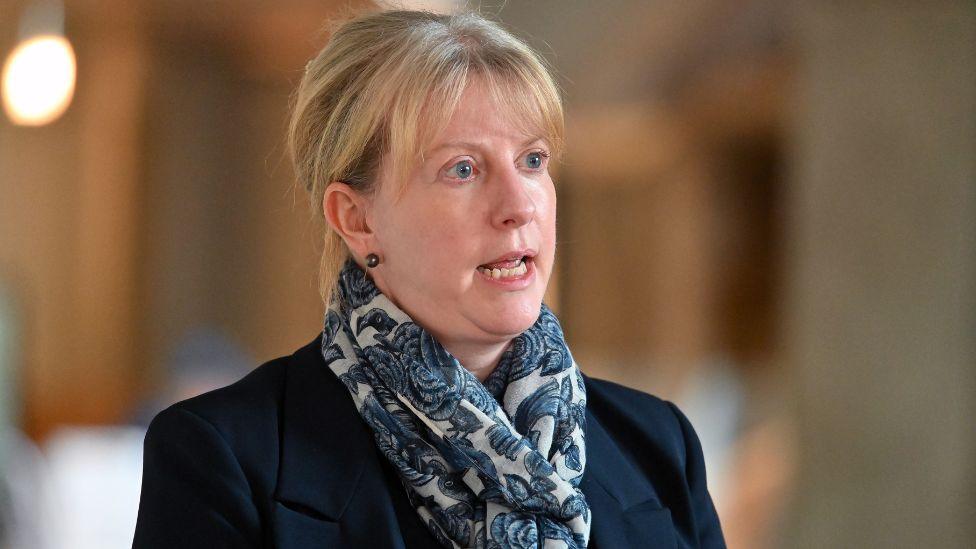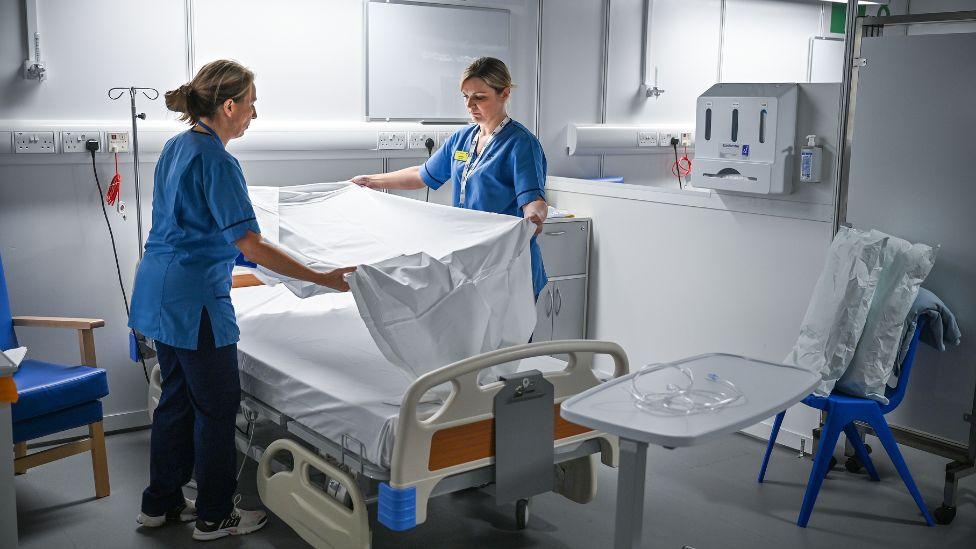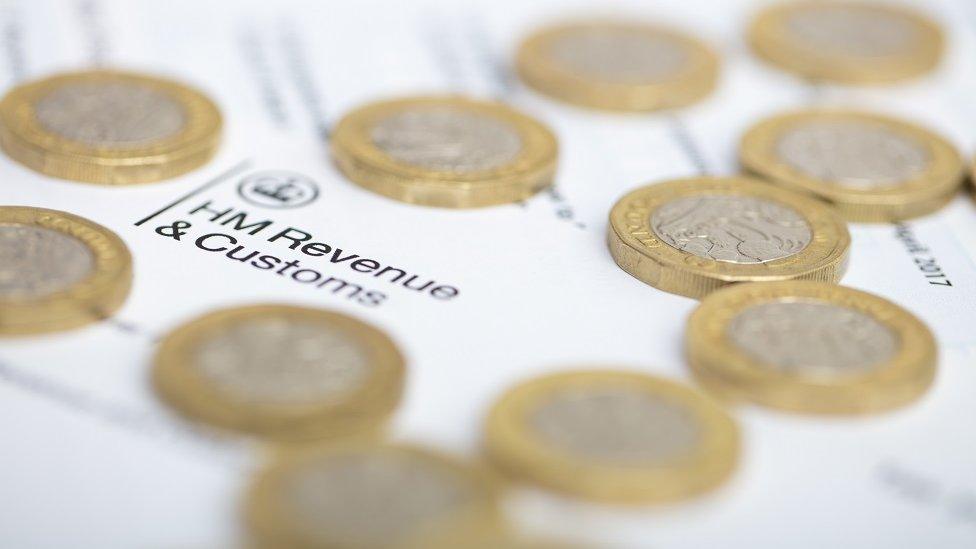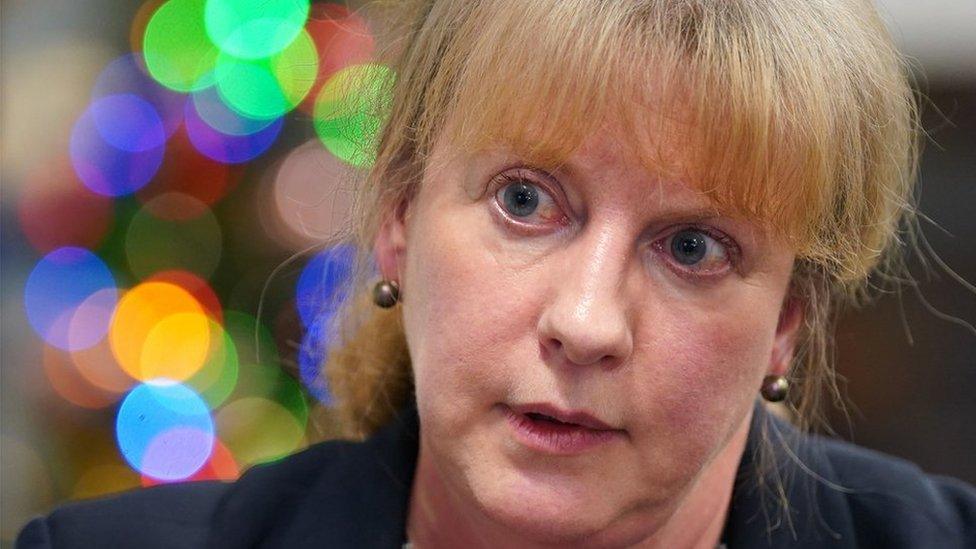Scottish budget plan 'misleading', says IFS think tank
- Published
- comments

Finance Secretary Shona Robison announced the government's budget proposals in December
The Scottish budget gives a "misleading impression" about spending increases, a think tank chief has said.
Institute for Fiscal Studies associate director David Phillips warned it was unlikely NHS Scotland would "survive" without extra funding this year.
Ministers said health spending would rise by 1.3% in real-terms in 2024-25, compared to the 2023-24 budget.
But Mr Phillips said the health budget was actually being cut by 0.7% when in-year funding top-ups are considered.
The Scottish government stated in-year funding would be key to real-terms growth in 2024-25.
When Finance Secretary Shona Robison announced budget proposals in December, the government said it would deliver a 1.3% real-terms increase in health funding, as well as a 6.2% real-terms rise in funding for local government.
But David Phillips told BBC Radio's Good Morning Scotland programme that this created a "misleading impression".
He said the projected 1.3% real-terms increase in health funding "ignores" an extra £600m added to the health budget during 2023-24. Mr Phillips said when this is taken into account, the new budget figures would represent a 0.7% decrease in real terms.
A new Institute for Fiscal Studies (IFS) report showed local authorities were given in-year top-ups amounting to £310m in 2023-24, as well as being permitted to use some capital funding to cover day-to-day spending.
When this is taken into account, along with local authorities being told they will not receive full grant funding from Holyrood unless they freeze council tax, the IFS projected an overall real-terms increase of just 1.8%.
Mr Phillips said: "The reason that's important is it suggests that councils and hospitals and so on will actually find it more difficult next year to manage their budgets than those headline figures the Scottish government has been saying, those increases that they've been promoting."

NHS Scotland would struggle to "survive" under the current budget proposals, according to the IFS associate director
He said it was "almost certain" funding top-ups would be required again this year.
"I can't imagine the NHS will be able to survive with a 0.7% real-terms cut, what with the issues in terms of waiting lists post-Covid, what with increases in pay," the IFS chief said.
The think tank also found spending on social justice would be down by 10.2% in real terms in 2024-25, with the budget for the wellbeing economy, fair work and energy portfolio falling by 5% in real terms.
Holyrood's finance committee has previously called for the Scottish government to adopt a similar approach to that of the UK government in comparing its spending plans with the latest estimates or outturns from the previous year's spend. In a budget report published last week, external, the committee said doing so would "support transparency and maximise opportunities for scrutiny".
Mr Phillips backed this approach, adding: "We need to know the real starting position, not what the starting position was going to be back in December 2022 before they realised they needed to put more money in this year."
A Scottish government spokesperson said: "Scottish ministers have provided a real terms increase in health funding when comparing the opening position for 2024-25 with 2023-24. This includes fully passing on all health consequentials received for 2024-25."
They added: "As this IFS report acknowledges, additional in-year funding is crucial to maintaining that real terms growth, requiring the UK government to prioritise additional funding for health over the course of the year."


Let's say you have £100 at the start of the year. But at some point down the line, you're running low and get an extra £20.
If you start the next year with £110, is that a £10 increase or a £10 decrease compared to the year before?
That's an oversimplification of the economics we're talking about here, but this is what the IFS is questioning.
And it should be pointed out that the IFS is a very respected think tank, widely regarded as authoritative when it comes to government spending.
When Scottish ministers talk about real terms budget increases (those adjusted for inflation), they say it's right to compare with this point last year - when the budget was set.
But the IFS point out that this doesn't take into account various "top-ups" that were given over the course of the year.
And therefore, the IFS says, a more sensible starting point for comparisons is what was actually spent, rather than the estimates from a year ago.
Perhaps most significantly, if you take into account these "top ups" the IFS says health spending actually falls between this year and next.
But it's also important to note that the Scottish government may apply top-ups throughout the course of this year.
No-one is necessarily right or wrong on this discussion - it depends on the starting point. But context is important when trying to gauge spending for the year ahead.
MSPs are scheduled to vote on the budget plan at the end of the month.

The IFS also found that available funding for devolved public services and social security spending would be "slightly" reduced by the increase in income tax for those earning £75,000 a year or more - who will pay the new "advanced rate" of 45p - and the freeze in council tax.
It said this was because the new tax band will raise an estimated £8m, while the government will give local authorities £144m for the council tax freeze.
But the think tank described the changes as progressive overall.
It found lower income households would not be impacted by income tax rises, but will benefit from the freeze in council tax, while higher earners will "in many cases see a much bigger increase in income tax bills than they will save in council tax, reducing their net income by an average of 0.7%".
'Pain is almost certainly coming'
Bee Boileau, a research economist at IFS, said there was "significant uncertainty" about how much funding the Scottish government would have available after 2024-25.
She said: "Funding from the UK government will depend on how much the UK government decides to spend, and how it is allocated between different services, which we won't have real clarity on until after the UK general election.
"And funding from devolved tax revenues will depend not only on how fast revenues in Scotland grow, but also on how that compares with growth in revenues in the rest of the UK, and how accurate the forecasts of both of these are. That's a lot of moving parts and must be a real barrier to medium-term planning."
But the expert said that "pain is almost certainly coming" as she said that barring either a major economic upswing, or further big tax rises, the Scottish government would face "difficult decisions for a range of public services".
Scottish Conservative finance spokeswoman Liz Smith said: "The IFS analysis makes it clear that the impact of the SNP's savage tax-and-axe budget will be even worse than it first appeared."
Labour finance spokesman Michael Marra said: "The SNP is planning to axe public services and is trying to dupe the public about it - but no-one is fooled.
"These cuts will wreak havoc at a time when local government is already at breaking point and almost one in six Scots are stuck on NHS waiting lists."
- Published19 December 2023

- Published19 December 2023
